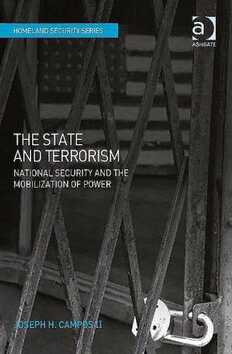
The State and Terrorism (Homeland Security) PDF
178 Pages·2007·0.719 MB·English
Most books are stored in the elastic cloud where traffic is expensive. For this reason, we have a limit on daily download.
Preview The State and Terrorism (Homeland Security)
Description:
An innovative approach to the ongoing debate over homeland security and state response to terrorism, Campos investigates the contextualizing of national security discourse and its management of terrorism. New ideas developed in this book reflect ways in which national security is mobilized through specific discourse to manage threats. In addition, a review of presidential rhetoric over the last 30 years reveals that national security discourse has maintained an ideological hegemony to determine what constitutes violence and appropriate responses. Campos incorporates historical depth and critical theory in a comparative framework and provides an invaluable insight into how national security is developed and how it works with the concept of terrorism to secure the state.
See more
The list of books you might like
Most books are stored in the elastic cloud where traffic is expensive. For this reason, we have a limit on daily download.
